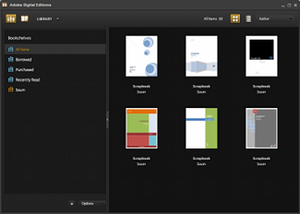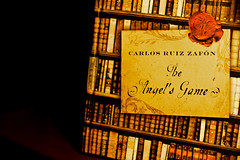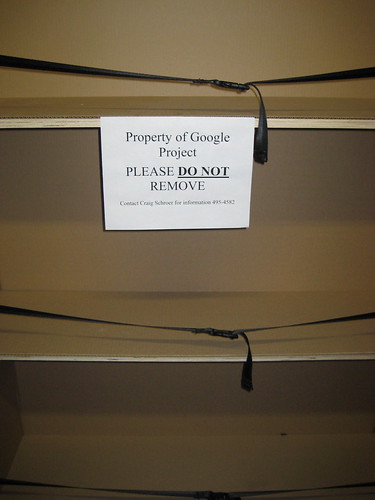Recent articles in the New York Times, Chicago Tribune, and now the Wall Street Journal have discussed e-books and printed books. Some of the top e-book blogs have dismissed these articles as simply anti-technology, one at Print is Dead goes so far to say that
print is a vegetable.
SNIP
"This is completely the wrong approach to take. I mean, to force print down people’s throats as if it’s a vegetable they don’t want to eat is just about the worst strategy I’ve ever heard of. (Believe me, when I was a kid I hated lima beans, and my mom insisted I eat them; I dutifully shoved them down my prepubescent gullet, but as an adult I never touch them). So to try and guilt people to read print implies that to do so is a sacrifice; worse, that’s it’s a kind of punishment. It turns reading newspapers into a kind of penance for a digital life, a modern-day flogging in the form of papercuts and inky fingerprints.
Just because something’s on paper doesn’t make it divine; it doesn’t even make it good. But Clark’s just interested in cozying up with newspapers in his breakfast nook, feeling all warm and sanctimonious. Meanwhile, I’ll be reading The New York Times on my laptop, and doing just fine."
END SNIP
This article is in context to newspapers in print versus newspapers online. However, there is an interesting point in this quote, "Just because something's on paper doesn't make it divine..." Isn't this true? The first wave of the e-book was easily scuttled because of back-lit computer screens. Behind that, was an anti-technology sentiment. In the second wave, that sentiment is more at the forefront since the technology scuttles the problems of reading a book on a computer screen. Even without the readers with special e-ink, many people report that they can read on their portable devices just fine. Take this article from the Chicago Tribune:
SNIP
"The experience taught me that a book is not what I had thought it to be. It is not, in any important sense, typeface, paper stock or cover art. A book is, foremost, the arrangement of words in sequence, and they are, to borrow a buzz-phrase from the digital folk, platform agnostic.
To be sure, I am enough of a traditionalist to still want to own hard-copy books, and enough of a literature snob to want to have books on display in shelves. But that will be only one wing of my library.
Count me as an e-book convert, persuaded that their eventual widespread adoption is more than a pipe dream.
And now, I have to pick up my cell phone again. Ms. Austen is calling."
END SNIP
The writer in the article discusses his new love of e-books. He was surprised that he would like it so much. He found that the screen wasn't so bad and that the selection that it opens up, referring to Project Gutenburg and the availability on the mobi-pocket reader site, creates millions of books one could download for free. In fact, the only drawbacks are ones of sentimental value. I can't have the book on my shelf or I can't feel the book and have that experience.
A response to this article can be found on slowreading.net
SNIP
"I post these things at Slow Reading because I am truly fascinated by people’s experience of eBooks. I think they have their place, but in my opinion, they are no substitute when reading books like Austen for pleasure. Johnson disagrees. I’m sure I could put up with an eBook if I had to, but why would I want to?...I’m playing around with audio-books, too. I think of these things like meal substitutes; they’ll do in a pinch, but they’re not the genuine article.
END SNIP
I liked the last line here, "...they'll do in a pinch, but they're not the genuine article". I responded to his post stating that this person was probably so used to reading his blackberry, that he did not notice the format change. Mobile devices, in my opinion, don't create the same eye strain because the back-lit portion isn't as strong as a computer screen.
I have actually had the same experience. I have been reading David Copperfield on my Dell Axim and I haven't noticed any eye strain. I haven't read on it for longer than 30 minutes at a time, but it sure is convenient to always have a book to read on you. I find I read more often and faster I have it, plus it fits in my pocket.
People don't change behaviors based on technology, the technology must be slipped into those already set behaviors in order to be adapted. This is a way e-books can be adopted in a more widespread way, which leads to the quote:
To be a book-collector is to combine the worst characteristics of a dope fiend with those of a miser.
Robertson Davies
Most readers, book lovers, and collectors want the book to be as free as possible. The argument with e-books is that one has to purchase a device just to read a book. However, paying a small fee now enables one to read millions of books for free. You don't have to purchase all the classics, even though they make you look quite intellectual on your bookshelf, you can get them on your mobile device. Mobile devices are increasingly used in the same way books are used and read in the same ways. You don't get the status of having a big bookshelf, but you get the same books. Maybe there should be some way to show off your bookshelf status in your home. We can already do it with LibraryThing or you can show off how many books you have read over at goodreads.com
Of course, you can still buy the books to display, and read them on an e-book device. I read the classics that way and I have the nice leather-bound gold-leaf editions on my bookshelf. Then again, I read most of my books from the public library, so I can't put them on my shelf for status, but I can make a list on goodreads.com
Lastly, on the use of e-books for the general public, comes an article from the New Yorker:Future Reading, Digitization and its discontents:
SNIP
For now and for the foreseeable future, any serious reader will have to know how to travel down two very different roads simultaneously. No one should avoid the broad, smooth, and open road that leads through the screen. But if you want to know what one of Coleridge’s annotated books or an early “Spider-Man” comic really looks and feels like, or if you just want to read one of those millions of books which are being digitized, you still have to do it the old way, and you will have to for decades to come. At the New York Public Library, the staff loves electronic media. The library has made hundreds of thousands of images from its collections accessible on the Web, but it has done so in the knowledge that its collection comprises fifty-three million items.
END SNIP
Again, the concept of the divine in discussing the printed word. If you want to actually feel the book, you need to go to the public library. The actual concept of holding the book rather than reading its contents is more important here. The article discusses in depth the evolution of the book and reading and in a very romantic way. It did provoke a response from the
Teleread blog:The New Yorker is as wrong about e-libraries as Martin Luther apparently was about paper booksSNIP
Here’s a challenge for
The New Yorker. Can its contributors write up e-libraries without droning on about how we’ll always need paper books? Is every e-book lover an arson-minded Visigoth eager to burn down the great paper collections or rob them of funding? And do we all hate the idea of paper backups—or, for that matter, Main Street bookstores?
END SNIP
Teleread often laments why so many people hate digital books. The New Yorker laments the loss of the feel of the book. The Chicago Tribune laments the loss of the bookshelf (as status?). The Poynter institute also laments the feel of the newspaper "Hold it in your hand. Take it to the john. Just read it.” I also remember reading something when LAMA digitized their journal. They also stated something to the affect that you can take your reading device "to the john" as well. So there is an obvious difference between e-books and print books, the problem is not the content, or how the book is read, but the actual book that is the difference. They want to hold the book and have it on their bookshelf. Replication of that is that last barrier to total adoption.
Briefly, I will discuss the increased use of mobile readers for students. The Georgia Tech library experimented with e-books with their students, from the
LITA Blog:
SNIP
"“Young people are open to accessing electronic material on mobile devices.” E-book readers should be like print,
but better. E-book readers should offer the same types of flexibility and options that are expected with other mobile devices. They should merge the benefits of digital with that of paper: create something new that allows for taking notes in the margins of a hypertext medium.
END SNIP
So the barrier to e-books for students is extremely low. They are already ready for this format because they are used to digital devices. At the end of the presentation, it even recommends that popular fiction can be retrieved faster using ebooks, that Sony e-readers should be provided for circulation in libraries, and that e-books should be easier to find.
Further,
Teleread is starting an initiative to help promote
e-books for students.
Their proposal:
This project is a continuation of the six-year Ball State University research on digital reading. Its aim is to discover if the use of Wireless Handheld Devices (WHDs) can increase learning and if they can be introduced effectively into the classroom. If it can be shown that there is value in using WHDs, this project will lay the groundwork for determining how such devices should be used as well as the defining the necessary training for students and teachers.
END SNIP
Lastly, a recent report by the Department of Education stated that technology and media have permeated all households. Therefore, the use of technology to promote literacy is a valid path to take. I discuss more of that report
here.
What's it all mean? E-books are on the way in.
1. The producers have already found a way to make reading acceptable on the eyes.
2. The proliferation of mobile devices and mobile screens have made that requirement less stringent. With so many "crackberry" addicts and ipod users, the tiny screen to read is not a problem.
3. The media has found a way to replicate reading habits. You can read it in bed, on the train, and some say
even in the tub. A thorough analysis of the sony e-reader can also be found from the
Travellin' Librarian Blog.
4. The producers need to find a way to bring the nostalgia to e-books. People like the format of the book because of the nostalgia aspect.
5. The producers need to find a way to create the status of the e-book. How many books on your reader? How many do you own? It won't replicate collection.
6. Digital Rights Management will hinder selection.
The last point affects public libraries the most. As many libraries are providing products like overdrive (downloadable e-books, audiobooks, music, and movies) the selection is rather sparse. This is due to the fact many of the publishing, music, and movie industry does not want to release these items digitally. However, they already produce it to us in a physical format. What really is the difference? This is the biggest hurtle to which there may be no immediate solution, except a change in the laws.
 I often tell people that I am a big believer in the magic of
libraries. They provide inspiration and hope, no matter their size. Today,
libraries can be everywhere. From the massive buildings that dominate a downtown landscape,
to the small branches in malls where people shop, book machines on the walk home from school, and
even on your smartphone, libraries are there. The biggest challenge is getting
this message across. How do we find ways to tell this story to the local
community? To get people excited about it, and ultimately change their
perception and gain their support? I believe it is in this magic that we can spread that message.
This misconception is an opportunity to surprise and delight. It’s our own
shock and awe, and we can deliver that to our communities.
I often tell people that I am a big believer in the magic of
libraries. They provide inspiration and hope, no matter their size. Today,
libraries can be everywhere. From the massive buildings that dominate a downtown landscape,
to the small branches in malls where people shop, book machines on the walk home from school, and
even on your smartphone, libraries are there. The biggest challenge is getting
this message across. How do we find ways to tell this story to the local
community? To get people excited about it, and ultimately change their
perception and gain their support? I believe it is in this magic that we can spread that message.
This misconception is an opportunity to surprise and delight. It’s our own
shock and awe, and we can deliver that to our communities. One of the key principles to this process is a motto from
our Foundation: Your Library in More Places. The concept came up on a sort of
whim. I have written a regular feature for the local paper about our library
for several years. One of these articles was titled "Your Library in More Places." In this article, I discussed our book machine services and our efforts in renovating our libraries.
One of the key principles to this process is a motto from
our Foundation: Your Library in More Places. The concept came up on a sort of
whim. I have written a regular feature for the local paper about our library
for several years. One of these articles was titled "Your Library in More Places." In this article, I discussed our book machine services and our efforts in renovating our libraries. Book machines are the easiest and cheapest way for libraries
to provide books and materials on a 24/7 basis in a remote location. We've provided these machines outside of schools, inside job
centers, but most importantly, where books are simply not available. A lot of
discussion today has been about how to get children school ready, as well as how to ensure children read at a third grade reading level by the third grade.
Access to books is a key feature to that effort. There is much buzz about projects
such as Little Free Libraries, but this alone doesn't address the problem of getting books
into a community in the first place, especially in small rural towns. These
machines provide 300 books to children on a 24/7 basis. They get such heavy use
that we need to send staff out several times a week, just to replenish the
machine. Most of these areas are without any resources and have no access to
books or a library. Some of their schools do not even have libraries. It is in
this way that we can provide the key ingredient to literacy, and in a way that has the
greatest amount of access.
Book machines are the easiest and cheapest way for libraries
to provide books and materials on a 24/7 basis in a remote location. We've provided these machines outside of schools, inside job
centers, but most importantly, where books are simply not available. A lot of
discussion today has been about how to get children school ready, as well as how to ensure children read at a third grade reading level by the third grade.
Access to books is a key feature to that effort. There is much buzz about projects
such as Little Free Libraries, but this alone doesn't address the problem of getting books
into a community in the first place, especially in small rural towns. These
machines provide 300 books to children on a 24/7 basis. They get such heavy use
that we need to send staff out several times a week, just to replenish the
machine. Most of these areas are without any resources and have no access to
books or a library. Some of their schools do not even have libraries. It is in
this way that we can provide the key ingredient to literacy, and in a way that has the
greatest amount of access. It's also important to keep ahead of national technology trends and apply them to local community needs. E-books, digital maker spaces, and other technology are key pieces to the library's immediate future. Throughout a community, if someone looks at their smartphone for information, a library app can be there, complete with e-books, magazines, videos, reference materials and research. Even tutoring help is available! Now more than ever, libraries have the tools to show up in unexpected places and demonstrate their value.
It's also important to keep ahead of national technology trends and apply them to local community needs. E-books, digital maker spaces, and other technology are key pieces to the library's immediate future. Throughout a community, if someone looks at their smartphone for information, a library app can be there, complete with e-books, magazines, videos, reference materials and research. Even tutoring help is available! Now more than ever, libraries have the tools to show up in unexpected places and demonstrate their value.



![Reblog this post [with Zemanta]](http://img.zemanta.com/reblog_e.png?x-id=5d838db9-00da-4dc3-a1df-bb2ac0b09bd1)


![Reblog this post [with Zemanta]](http://img.zemanta.com/reblog_e.png?x-id=fd9c5842-85de-45b9-a514-e6266e64d0ba)


![Reblog this post [with Zemanta]](http://img.zemanta.com/reblog_e.png?x-id=c7bcf818-4e85-4214-893e-318db19d65aa)


